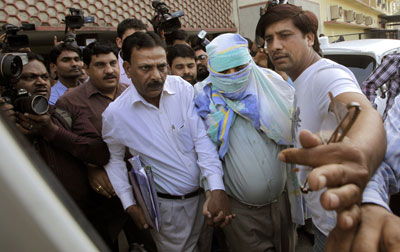To many in the Indian media community, the arrest of independent journalist Syed Mohammad Kazmi by the Delhi police’s Special Cell on March 6 for his alleged involvement in a bombing brings back troublesome memories.
The blast was that of a car belonging to an Israeli diplomat which local media reports have linked to Iran. While producing Kazmi before the Chief Metropolitan Magistrate, the public prosecutor said the bomb attack — in which the wife of the Israeli defense attaché was seriously injured — was a case of “international terrorism.”
Many reporters say the accusations against Kazmi remind them of 2002, when Delhi-based Kashmiri journalist Iftikhar Gilani was arrested and charged with espionage under the Official Secrets Act. The son-in-law of a Kashmiri separatist leader, Gilani was in prison for seven months as anonymously sourced, fabricated stories appeared in the media supposedly confirming his guilt. Speaking to CPJ, Gilani recalled the experience: “It was a classic case of trial by the media. Mohammad Kazmi should not be executed by the media as happened in my case. Already the coverage of his arrest has been one-sided, and that is dangerous,” he said. Ten years ago, with the tireless intervention of some media activists and friends, Gilani was eventually proved innocent and released.
Today, family, friends, media activists, and some political leaders came together to support Kazmi. In a chaotic outdoor press conference at the premises of the Press Club of India, speakers stressed Kazmi’s professional credentials and the unlikelihood of his being involved in any terrorist activities. An independent, accredited journalist, they said, Kazmi has been working regularly for several Iranian media outlets, including the Iranian News Agency, IRNA; India’s state broadcaster Doordarshan; the BBC; and has contributed columns to several Urdu publications. He also runs a small Urdu news agency, Media Star.
S.K. Pandey, general secretary of the Delhi Union of Journalists, the largest body of journalists in the country, said Kazmi was a journalist with “impeccable credentials.” “I have received more than 60 calls from journalists vouching for his integrity,” he told the press conference. Earlier, the Union issued a statement saying Kazmi should not be victimized simply because he worked for Iranian media outlets and for his professional contacts. “Possibly Kazmi’s close association with Iran media outlets is being used by the police to implicate him,” Pandey said.
Columnist and broadcaster Saeed Naqvi, who worked closely with Kazmi when he reported on the Iraq war, said he was an “honored and honest friend.” “With his knowledge of Persian, Arabic, Urdu, English, he was in demand as an interpreter and for international journalistic assignments. Sadly, what was considered to professional advantage is now turning out to be a disadvantage,” Naqvi said.
In an emotional speech, Kazmi’s son Shauzab called him a “national hero” and “one of the few Indian journalists who tirelessly covered the Iraq war in 2003.” It was on Tuesday that the police picked up Kazmi as he was leaving Delhi’s India Islamic Centre, and arrested him under provisions of the Unlawful Activities Prevention Act. Shauzab said that although police took Kazmi to the police station in the morning, they only informed his family of his whereabouts that evening when they came to his home in BK Dutt Colony to take away his desktop computer, laptop, passport, and other documents.
The Times of India suggested that Kazmi was helping the bomber, who it said has since has left for Malaysia, by carrying out surveillance missions on the Israeli embassy and by keeping track of the movements of Israeli diplomats, eventually leading to the attack on February 13. Kazmi is being kept in police custody for 20 days.
The Delhi Union of Journalists said it will appeal to the Delhi Commissioner of Police and the Press Council of India to press for bail for Kazmi and to ensure that fair scrutiny takes place. Pandey told CPJ: “We are not here to hamper any investigation. But enquiries should be thorough and the process transparent. If there is any evidence, he should be charged. Why keep him in prison without for 20 days, especially as he is cooperating with the investigation?”
